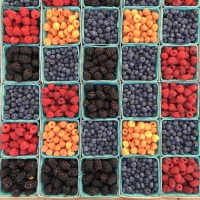Eating fresh, organic produce is not only a sensory delight but also a healthy choice that supports sustainable farming practices. The flavors of farm-fresh produce are unparalleled, owing to the careful cultivation and harvesting methods employed by organic farmers. In this article, we will explore the world of organic farm fresh produce, the benefits it offers, and how you can savor its exquisite flavors in your culinary endeavors.
The Essence of Organic Farm Fresh Produce
What is Organic Farming?
Organic farming is an agricultural method that emphasizes the use of natural fertilizers, biological pest control, and crop rotation to maintain soil health and promote sustainable farming practices. It avoids the use of synthetic pesticides, herbicides, genetically modified organisms (GMOs), and growth hormones, thereby minimizing environmental impact and preserving the nutritional quality of the produce.
The Benefits of Organic Farm Fresh Produce
Organic farm fresh produce offers several benefits, both in terms of taste and health. Here are some key advantages: beauty dior onlyfans price
-
Superior Flavor: Organic fruits and vegetables are known for their intense and authentic flavors. The absence of synthetic chemicals allows the produce to develop its full potential, resulting in a more vibrant and delectable taste.
-
Nutritional Value: Studies have shown that organic crops tend to contain higher levels of certain nutrients compared to conventionally grown produce. Antioxidant compounds, vitamins, and minerals are often more abundant in organic farm fresh produce, contributing to a healthier and more balanced diet.
-
Environmental Sustainability: Organic farming practices prioritize the conservation of soil, water, and biodiversity. By avoiding the use of synthetic chemicals, organic farmers contribute to the preservation of ecosystems, mitigate soil erosion, and minimize water pollution, thereby promoting a more sustainable future.
-
No Chemical Residues: Organic farm fresh produce is free from chemical residues often found in conventionally grown crops. Choosing organic ensures that you and your family are not exposed to potentially harmful substances commonly used in conventional farming.
-
Supports Local Farmers: By purchasing organic produce from local farmers, you support their livelihoods and contribute to the growth of sustainable agriculture within your community.
Embracing Organic Farm Fresh Produce in the Kitchen
Now that we understand the benefits of organic farm fresh produce, let’s explore how we can savor its exquisite flavors in our culinary experiences. Here are some tips and ideas to incorporate organic produce into your daily meals:
1. Shop Locally and Seasonally
When shopping for organic farm fresh produce, prioritize local farmers’ markets, community-supported agriculture (CSA) programs, or even grow your own garden. Locally sourced produce is often harvested at its peak ripeness, ensuring maximum flavor and nutritional value. Furthermore, selecting seasonal fruits and vegetables allows you to enjoy nature’s bounty while supporting sustainable agricultural practices.
2. Learn to Appreciate Earthy Flavors
Organic farm fresh produce often exhibits earthier flavors due to the absence of artificial enhancers and ripening agents. Rather than considering these flavors as a drawback, embrace them as unique and natural characteristics. Experiment with cooking techniques and pairings that enhance and complement the inherent tastes of organic produce.
3. Opt for Minimal Processing
To truly savor the flavors of organic farm fresh produce, it’s advisable to minimize processing techniques that may mask or alter their natural taste. Instead of heavily sautéing or overcooking vegetables, consider lightly steaming or roasting them. These methods preserve the produce’s original flavors while maintaining their nutritional integrity.
4. Explore Cultural Cuisine
Immerse yourself in the flavors of different cultures that celebrate organic farm fresh produce. From Mediterranean salads to Asian stir-fries and South American grilled vegetables, each cuisine offers a unique perspective on utilizing organic produce in delicious and healthy ways. Expand your culinary horizons and experiment with new recipes to discover exciting flavor combinations.
5. Enhance with Complementary Ingredients
To elevate the flavors of organic farm fresh produce, experiment with complementary ingredients that enhance its natural taste. Fresh herbs, spices, and high-quality oils are excellent choices to add depth and complexity to your dishes without overpowering the freshness of the produce. Consider incorporating garlic, lemon zest, balsamic vinegar, or chili flakes to amplify the flavors while keeping the focus on the organic ingredients.
Comparison Chart: Organic vs. Conventional Farming
| Organic Farming | Conventional Farming | |
|---|---|---|
| Pesticide Use | Avoids synthetic | Relies on synthetic |
| pesticides and | pesticides and | |
| fertilizers | fertilizers | |
| Environmental Impact | Focuses on sustainable | May contribute to |
| practices, | soil degradation and | |
| minimal | water pollution | |
| environmental impact | ||
| Nutritional Value | Higher levels of | Potential nutrient |
| certain nutrients | depletion due to | |
| compared to | chemical-based | |
| conventionally grown | agricultural practices | |
| produce | ||
| Taste and Flavor | Intense and authentic | May be influenced by |
| flavors | artificial enhancers | |
| Genetic Modifications | Prohibited | Allowed in some cases |
| Support for Local Farmers | Supports local farmers | May vary depending on |
| and communities | supply chains |
Conclusion
Savoring the exquisite flavors of organic farm fresh produce is not only a pleasurable experience but also a conscious choice towards healthier eating and more sustainable agricultural practices. By embracing organic produce, we support local farmers, reduce chemical exposure, and indulge in the vibrant and authentic flavors nature has to offer. So, let’s transform our culinary journeys by incorporating organic farm fresh produce into our meals and revel in the rich tastes and benefits it provides.










